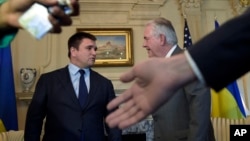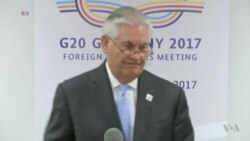U.S. Secretary of State Rex Tillerson got off to a good start with the media on his first day on the job February 2, breaking the ice in front of hundreds of State Department staff members by saying “Hi, I’m the new guy.”
But ever since then, he has doggedly ignored reporters’ questions at brief appearances with visiting foreign ministers and other dignitaries, never answering once and mostly not even acknowledging the reporters’ presence with a nod or a glance in their direction.
Veteran State Department reporter Andrea Mitchell could be seen on video being physically removed from the room while still calling out questions at a group news availability with Tillerson and the Ukrainian foreign minister March 7.
But it was Tillerson’s decision to break with a long established precedent on traveling with members of the State Department media corps on his first major trip to Asia that has become a major story in and of itself. Former U.S. Ambassador Laura Kennedy told VOA she finds this highly unusual.
“Well, I can't give you chapter and verse on every single trip that secretaries of state have taken over the years, but in my almost 40 years with the State Department, secretaries of state valued the press, so they wanted them along for a whole variety of reasons.”
Kennedy was appointed U.S. Ambassador to Turkmenistan in 2001 and assumed the role of Deputy Assistant Secretary for European and Eurasian Affairs in 2004. She is now retired.
She pointed out that Tillerson’s trip to Asia is particularly newsworthy because of worldwide concerns over North Korea’s missile tests, sure to be one of the main topics on the agenda. Kennedy said the appearance of a lack of media access is especially unfortunate since China is one of the stops.
“I think it is a particular opportunity when you're visiting a country like China that does not have a free press, when you don't have your own very vigorous free press along with you, I think it sends, frankly, a bad signal in terms of promoting the values of a free press that is a core value of the United States.”
WATCH: Tillerson Comes Under Fire For Lack of Media Access
Acting State Department spokesman Mark Toner was asked at Monday’s media briefing if Tillerson was sending the wrong signal to countries like China.
“This is not a message we would intend to send.”
Toner pointed out that Tillerson is holding a media availability at one of the three stops in Japan. Some U.S. media outlets, including VOA, are sending reporters on commercial airlines to cover the trip and are also filling in with reporters based in Asia, since it is virtually impossible for a reporter to keep up with a traveling secretary or president who is flying on his or her own plane.
On Friday, White House Press Secretary Sean Spicer was asked about Tillerson not taking reporters along, and if it was President Trump’s decision. Spicer repeated assertions made by the State Department that the decision was made for Tillerson to take a smaller plane to cut costs.
“No, we don’t get involved in the logistics for every Cabinet member’s trip. I would advise you to touch base with the secretary, with the State Department on this. But I know that that they, they have been made aware of some of the concerns of some of your colleagues, and they are making accommodations in the future with respect to the size of the plane.”
Media organizations actually pay for their reporters’ seats on planes, reimbursing the State Department, White House or other agency for travel costs.
Before coming to the State Department, Rex Tillerson was the CEO of ExxonMobil for 10 years and spent his entire career with the company. Steve Coll writes for New Yorker magazine and wrote a book on Exxon, Private Empire: ExxonMobil and American Power. Coll says that Tillerson was also averse to media contact when he was at Exxon. Colls says Tillerson has valuable skills that will serve him well in the job. But he also finds Tillerson’s media avoidance in his new role strange. Coll says being the face and the voice of U.S. diplomacy is a key part of his job as U.S. Secretary of State, the most important voice after the president of the United States.
Acting State Department spokesman Toner rejected any suggestion that the voice of the State Department has gone silent under Tillerson, or that he has been marginalized in the Trump administration:
"Secretary Tillerson is very engaged with the White House, very engaged with the president -- speaks to him frequently, was over there just yesterday, I believe, for a meeting. And I can assure everyone that the secretary's voice, the State Department's voice, is heard loud and clear in policy discussions at the National Security Council level."
State Department Correspondent Nike Ching contributed to this report.






